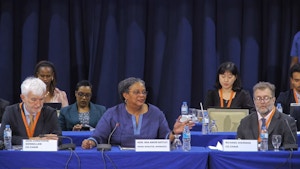#climate finance Berita

Kebijakan & Keuangan
Concerns emerge over scaled down loss and damage fund
The global fund’s fifth meeting closed with the amount available to help vulnerable nations cope with climate risk reduced by more than US$50 million.

Kebijakan & Keuangan
Ways to improve Malaysia’s ecological fiscal transfers
Increasing allocations and giving states more freedom on how they can spend EFT funds could make this mechanism more effective, say conservationists. Malaysia's environmental sustainability minister Nik Nazmi also agrees there is a good basis to make the scheme more permanent, but in-depth discussions must be held with the states, he told Eco-Business.

She succeeds Thomas Brzostowski, who was interim Singapore country director, and will be a senior advisor for regional climate and conservation initiatives.

Karbon & Iklim
Bright spots in the dark: Tracking Malaysia’s fiscal transfers for nature conservation
The federal government says the Ecological Fiscal Transfer (EFT) approach has spurred state governments to expand protected areas and run more conservation programmes. Yet as environmentalists are calling for more EFT funding, our latest analysis finds little transparency on most of the money disbursed, despite some state-level data from Johor and Sabah.
Kebijakan & Keuangan
OCBC to strengthen nature risk assessment, but faces scrutiny over mining ties
Kebijakan & Keuangan
Q&A: 'Moment of reckoning' in fight against AIDS, TB, malaria
Pangan & Agrikultur
India's farm insurance proves costly for most vulnerable
#climate finance Opini

Kebijakan & Keuangan
Can COP30 succeed where COP29 failed?
There is scepticism around climate finance through private investments, and if private finance is to play a bigger role, policy reforms ahead of this year’s COP30 are needed. Alternatively, could the G20 or BRICS lead on climate finance?

Karbon & Iklim
Sustainability in an unstable world
The rise of 'greenhushing' – when companies downplay environmental risks for financial or political reasons – reflects not just changing communications strategies, but rising tensions between competing priorities.

Kebijakan & Keuangan
Adaro’s coal spin-off highlights gaps in bank coal exit policies
After spinning off its thermal coal assets, Adaro Energy Group, the world’s sixth-largest coal mining company, will have access to financing from two banks that previously withdrew funding for its aluminum smelter project in February 2023.

Karbon & Iklim
Meltdown at the top of the world
The UN has declared 2025 the International Year of Glaciers' Preservation as climate change speeds up ice loss not only in the Arctic and Antarctica, but in Asia's Hindu Kush Himalayas, which is warming three times the global average rate.
Kebijakan & Keuangan
Getting green investment where it’s needed most
Kebijakan & Keuangan
The Fed is running scared of Trump
Kebijakan & Keuangan
Southeast Asia's frustration with the state of climate finance
Perkotaan
The climate policy pendulum
#climate finance Video

There is consensus that coal needs to be retired early in Asia, but the mechanisms for financing the phase-out are not clear. This mini-documentary examines how transition credits work and whether they can fund Southeast Asia's equitable switch to clean power.

Studio EB
From sponge cities to coastal forests, Asia is seeking ways to work with nature and prepare for the risks in a warmer-than-expected future. This Eco-Business video looks at what else cities need to do to strengthen climate resilience.

Karbon & Iklim
Activists protest fossil fuel funding at COP27
Rich nations need to shift investments into renewables instead, they say. The civic space for demonstrations at this year's climate summit, held in Egypt, is more restricted than the Scotland event last year.
#climate finance Podcasts

Kebijakan & Keuangan
As US pulls back, ‘huge opportunity’ for Asia to lead in global transition
Trump 2.0 may prove to be a "bump in the road" for climate action, but banks and investors in Asia see growth and opportunity in the region for decarbonisation as climate risks grow.

Karbon & Iklim
‘Five years ago, everyone wanted to be Elon Musk’: Where is climate tech in Southeast Asia now?
Entrepreneur Steve Melhuish tells the EB Podcast where the biggest opportunities to reduce emissions and make money are in Southeast Asia, and why finding the right economic incentives is critical for climate tech startups.

Kebijakan & Keuangan
The race to insure Southeast Asia against climate risk
Asia lags the world in natural catastrophe protection. Part of the problem could be counting extreme weather losses only after they happen, industry insiders tell the Eco-Business podcast.

Kebijakan & Keuangan
‘We do not just adopt global standards, we respond to domestic challenges’: Philippine central bank exec Lyn Javier
The Bangko Sentral ng Pilipinas assistant governor tells the Eco-Business Podcast about the regulator’s maiden sustainability report that features an empirical study of climate impacts on banks as well as the nation’s first taxonomy.
#climate finance Rilis Pers

United Nations Economic and Social Commission for Asia and the Pacific (ESCAP)
Investing in making complex ideas accessible: Bridging the gap in sustainable finance data

United Nations Economic and Social Commission for Asia and the Pacific (ESCAP)
Rethinking climate finance to work for women in Nepal’s coffee, pashmina value chains

UN Trade and Development (UNCTAD)
Financing for development: Reforming global systems to drive progress

UN Development Programme (UNDP)
Green Climate Fund approves US$103 million to strengthen early warning systems for vulnerable countries

UN Development Programme
Ballooning debt service payments in poorest countries reach alarming levels, UNDP warns

United Nations Development Programme (UNDP)
New GEF funds towards UNDP supported projects to benefit 9.4 million
#climate finance Riset

Eco-Business for Temasek's Ecosperity
Ecosperity Week 2024 post-conference report: Renewing our Vibrant Spring





